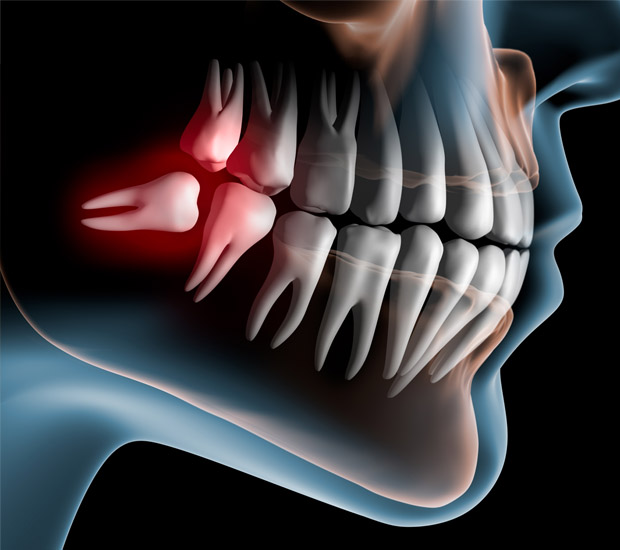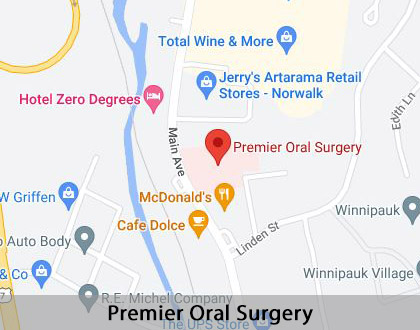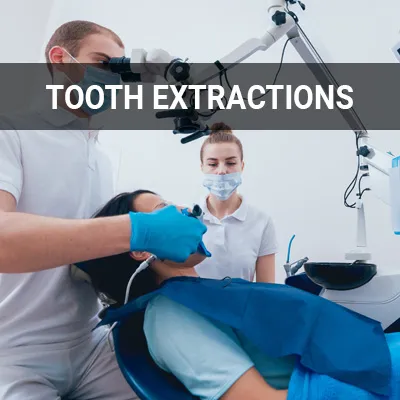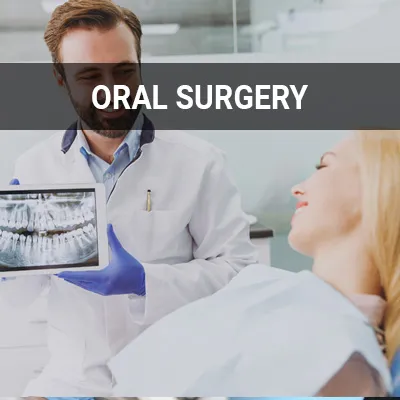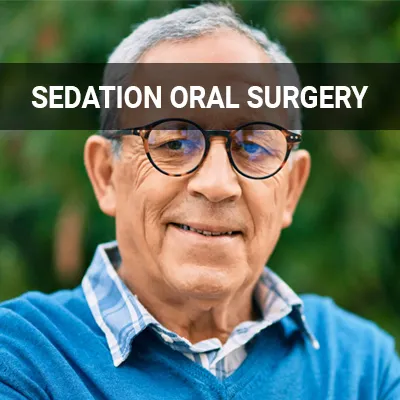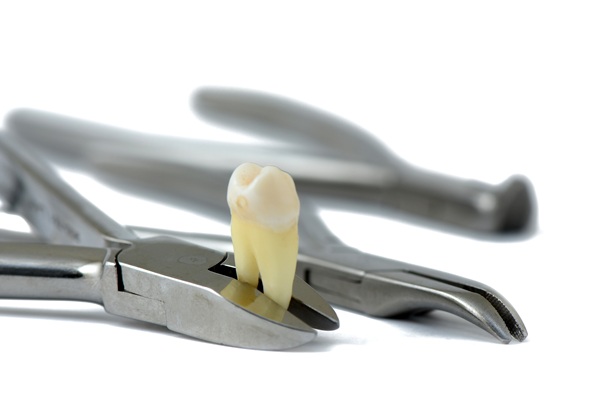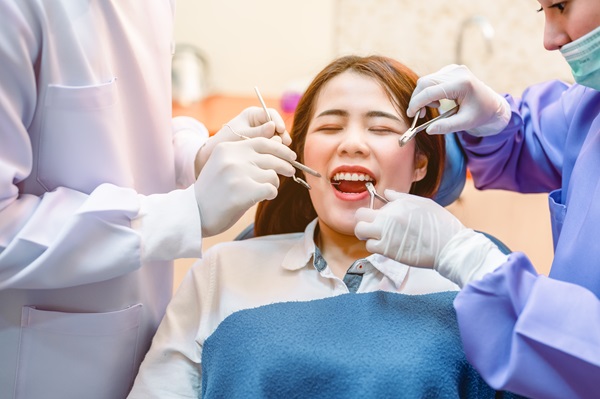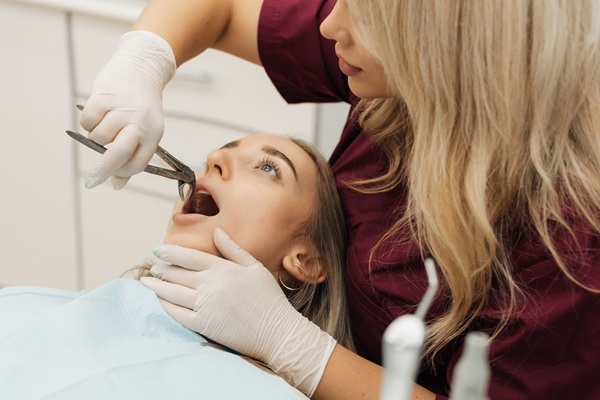Wisdom Teeth Extraction Norwalk, CT
Wisdom teeth extractions remove the third and final set of molars in the mouth to permanently relieve pain, alleviate soreness, and prevent teeth alignment issues that hinder one’s quality of life. During the procedure, an oral surgeon can ensure the patient remains comfortable with proper numbing or anesthesia.
Wisdom teeth extractions are available at Premier Oral Surgery in Norwalk and to people in the surrounding area. Call us at (203) 945-0049 to schedule an appointment and receive the professional oral health care you need today.
Understanding Wisdom Teeth
Wisdom teeth are the third and final set of molars that can form in one’s mouth between the late teens and early twenties. Although not everyone will develop wisdom teeth, one study found that 53% of people had at least one developed wisdom tooth. While some people will not consider treatment unless there is significant pain, leaving wisdom teeth in the mouth can result in serious health issues and pain at varying times in one’s life.
There are multiple types of positions that wisdom teeth can form in, causing a variety of health issues, including impacted wisdom teeth, crooked wisdom teeth, or overcrowded wisdom teeth. Impacted wisdom teeth do not completely break through the gums. Along with causing pain, swelling, and stiffness in the jaw, they can also allow bacteria to enter through the gums. Crooked wisdom teeth can emerge at an angle, crashing into surrounding teeth, causing significant pain, irritation, bite issues, and more.
If a mouth is overcrowded with teeth, the wisdom teeth will only add to this issue. Overcrowding can lead to crooked teeth, misalignment, pain, soreness, bite issues, and more. Thus, an oral surgeon can determine if a wisdom teeth extraction may be the most efficient and effective method to alleviate pain and prevent these issues from worsening.
“Wisdom teeth are the third and final set of molars that can form in one’s mouth between the late teens and early twenties.”
Potential Risks
In some cases, a wisdom tooth extraction may require a surgical approach to open the gum tissue and remove the bone, helping to treat the core of the issue instead of just the symptoms. While this procedure can carry some risks, our team will take all necessary precautions to ensure the patient’s comfort and safety during the procedure. Should the patient experience any concerns or health problems after the procedure, it is crucial to call our oral surgeon as soon as possible. Some possible complications may include:
- Dry socket: This occurs when the blood clot over the extraction site gets dislodged. Dry socket leaves the nerve under the gums exposed to air and food debris. Patients should contact us about any sharp, throbbing pain so we can clean the site and cover it.
- Excessive Bleeding: Bleeding for the first eight to 12 hours after extraction is normal. We recommend refraining from smoking and eating soft foods to minimize bleeding. Patients can also rinse with salt water while waiting for a blood clot to form over the extraction area.
- Limited Mouth Opening: Patients may experience difficulty opening their mouths after this lengthy procedure. This restriction and discomfort should disappear after a short period. If it remains, we may recommend heat therapy, pain medication, or a jaw-opening device.
Following care instructions and notifying us about any issues can help prevent or reduce these complications.
“In some cases, a wisdom tooth extraction may require a surgical approach to open the gum tissue and remove the bone, helping to treat the core of the issue instead of just the symptoms.”
Preparing for the Procedure
During an initial consultation, our oral surgeon will review the patient’s teeth, X-rays, medical history, and other pertinent factors to help customize the treatment plan. We will review the procedure, anesthetic options, and any necessary aftercare steps to take with the patient during this appointment. This is a great time for the patient to ask any questions about the procedure, follow-up care, and more.
Along with taking time off work to help recover, the patient will need to schedule a ride to and from the appointment. While the anesthetic will wear off after the procedure, the patient will not be in a proper state to drive at that time. Along with that, we will typically give the patient a prescription for pain medication they can use for the next few days to help relieve any pain.
We will also review possible dietary restrictions the patient will have to follow in the first few days after the procedure.
“During an initial consultation, our oral surgeon will review the patient’s teeth, X-rays, medical history, and other pertinent factors to help customize the treatment plan.”
Check out what others are saying about our dental services on Yelp: Wisdom Teeth Extraction in Norwalk, CT
Wisdom Tooth Extraction
Before we begin the procedure, we will use anesthetic to not only prevent the patient from feeling anything but also ensure the patient is asleep during the procedure. This means that the patient will not remember any of the procedure except before and after. However, the anesthesia will wear off fairly quickly following the procedure. The surgeon will use dental surgical tools to open the gum tissue to remove any bone covering the tooth.
Our oral surgeon then separates the tissue that connects the tooth to the bone before removing the wisdom tooth. In some cases, the tooth is broken into smaller pieces to make removal easier. After the tooth extraction, we will clear the residual bone and teeth from the extraction site. If necessary, we will use stitches to close the wound to aid the healing process. We will then cover the extraction site with gauze to control bleeding and promote blood clot formation.
“Our surgeon then separates the tissue that connects the tooth to the bone before removing the wisdom tooth.”
Questions Answered on This Page
Q. How do wisdom teeth emerge?
Q. Are there any potential risks of a wisdom tooth extraction?
Q. How can I prepare for a tooth extraction?
Q. What happens during a wisdom tooth extraction?
Q. What happens after the procedure?
People Also Ask
Q. Why would I need a tooth extraction?
Q. What are the different types of sedation?
Q. What are the symptoms of a cracked tooth?
Q. What are oral pathology signs and symptoms?
Q. What diseases or conditions can cause bleeding gums?
Q. Why are dental implants a great restorative option for most people?
After the Procedure
After the procedure, it is important to follow the post-operative instructions to ensure a smooth healing process. Some oozing of blood is normal after the procedure, but avoid excessive spitting, which can cause the blood clot to dislodge from the socket. Patients can also apply an ice pack to reduce bruising and swelling. We recommend drinking plenty of water and sticking to soft foods for the first 24 hours.
Patients should notify us immediately about any abnormal symptoms after the procedure. These signs can indicate an infection or other complications. Abnormal symptoms include:
- Blood or pus in nasal discharge
- Difficulty breathing or swallowing
- Excessive bleeding
- Fever
- Persistent numbness
- Severe pain not relieved by pain medications
- Swelling that worsens after a few days
“After the procedure, it is important to follow the post-operative instructions to ensure a smooth healing process.”
Frequently Asked Questions
Q. When is the best time to have wisdom teeth extracted?
A. Extraction is usually easier for younger people as the tooth bones and roots are softer. It is also a good time to remove wisdom teeth when there is one-third to two-thirds root formation. Another consideration is whether the teeth can erupt into a more easily removable position.
Q. How should I clean my teeth after getting my wisdom tooth extracted?
A. Patients should not brush their teeth, rinse, or use mouthwash for 24 hours after the procedure . Gentle brushing, while avoiding the extraction site, can resume after that time. During the next week, patients must also rinse with salt water every two hours and after every meal.
Q. What happens if I do not get my wisdom teeth removed?
A. Failing to remove a partially erupted wisdom tooth can lead to a bacterial infection called pericoronitis. A wisdom tooth that has not erupted entirely can also result in cyst development that can damage bone and gum tissue. Patients can also permanently damage surrounding teeth and throw off bite alignment.
Q. Why are wisdom teeth harder to remove than regular teeth?
A. Wisdom teeth are more difficult to remove than regular teeth because they often grow abnormally. Impacted wisdom teeth emerge in an angled position and require sectioning into pieces during extraction. Wisdom teeth also typically have multiple roots that can grow in irregular shapes and curvatures.
Q. Will I need stitches after wisdom tooth extraction?
A. Some patients may need stitches after wisdom tooth extraction. Dissolvable stitches do not need removal and will usually fall out two to seven days following surgery. Normal stitches will require removal after a few days.
Start Feeling Better – Visit Us Today
By visiting us as soon as possible, our team can help get you the professional treatment you need. Instead of waiting around and allowing the symptoms to get worse, we can provide you with treatment options.
Call Us Today
Wisdom tooth extraction can solve and prevent a variety of oral health problems. Our team at Premier Oral Surgery can help. Call us at (203) 945-0049 to schedule an appointment or learn more.
Helpful Related Links
- American Dental Association (ADA). Glossary of Dental Clinical Terms. <
> - American Academy of Cosmetic Dentistry® (AACD). Home Page. <
> - American Academy of Maxillofacial Prosthetics. American Academy of Maxillofacial Prosthetics. <
> - American Association of Oral and Maxillofacial Surgeons. American Association of Oral and Maxillofacial Surgeons. <
> - American College of Oral and Maxillofacial Surgery. American College of Oral and Maxillofacial Surgery. <
> - National Cancer Institute (NCI). National Cancer Institute (NCI). <
> - WebMD. WebMD’s Oral Care Guide. <
>
About our business, license, and website security
- Premier Oral Surgery was established in 2017.
- We accept the following payment methods: American Express, Cash, Discover, MasterCard, and Visa
- We serve patients from the following counties: Fairfield County
- We serve patients from the following cities: Norwalk, Cranbury, Spring Hill, New Canaan, Westport, West Norwalk, East Norwalk, South Norwalk, Wilton, Westport, Weston, New Canaan, Tokeneke, Rowayton, Darien, and Noroton
- Norton Safe Web. View Details
- Trend Micro Site Safety Center. View Details
Back to top of Wisdom Teeth Extraction
